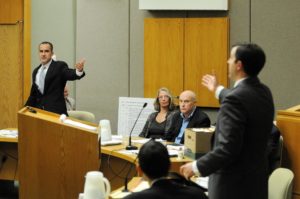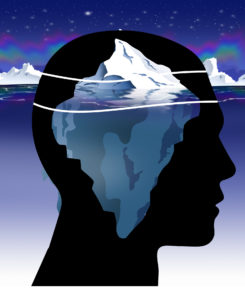Jim: I think first of all we have to differentiate between depressions because it‘s a blanket term which is used to describe many different experiences, different contexts and different internalized experiences of people. First of all, there is the kind of depression that is driven by biological sources and it is still a mystery as to how that works. We know it affects a certain number of people in profound ways. Second, there is reactive depression which is the experience of a person who has suffered loss and as we invest energy in a relationship or a situation and for whatever reason, that other is taken away from us, that energy that was attached to him will invert as depression. Reactive depression is actually normal.
We would have to figure out where that fine line is and where it might cross over into something that was more than normal. When we say that a person is grieving too long or it is affecting their lives so profoundly, that’s a judgment call, of course, but we do know people that have been sort of destroyed by reactive depression because they had attached so much of their identity to the other, whatever it might be: a position in life that they lost or a relationship that was important.
But I think none of us can avoid occasional reactive depressions because life is a series of attachments and losses. Most commonly, when we think about depression, however, we are really looking at a king of intra-psychic phenomenon where we might say there are parts of ourselves that are contending with each other.
If you think lawyers have to deal with outer-litigation, there is inner-litigation going on continuously as we are subject to a lot of interpersonal strife and conflict between values. For example, there are conflicts of duty and we have an obligation to many competing values within us. I mean, one of the most obvious duties that we all live with is that you have to earn a living to support yourself and your family and on the other hand, the price of the particular way in which you are doing it is psychologically and perhaps, physically, costly to you. So already, there is a significant conflict there. If the ego continues to override that conflict without addressing it, we could expect the symptoms, including the symptoms associated with depression, to show up.
In effect, the good news and the bad news are the same here in the sense that the psyche is not passive, it’s active, it’s continuously expressing its point of view and it is manifesting in our body which is somatic issues in our emotional life, in our behaviors and of course, in our dream life. Those expressions of opinion are often something we call “symptoms” in the contemporary mindset and we want to sort of replace symptoms as quickly as possible and that is understandable. At the same time, the real question is why have they come, what is our own psyche trying to say to us. Or, put it another way, for what reason is my psyche refusing to cooperate with the agenda that my conscious life has addressed and emerged into?
The withdrawal of energy is often profoundly conflictual within and produces a lot of suffering. The more I might push myself, the more depressed I might get. So from a psycho-dynamic standpoint, you would say, well, what really is the value conflict here and how is it that we can learn from the psyche and what we might consider a more appropriate set of choices for you.
Dan: You know, from what I have seen and from what I have researched, about 10% of the U.S. population suffers from depression. There have been a couple studies actually about lawyers and law students with depression that show that as many as 40% of law students in America at some point during their 3-year career as law students will deal with depression. Out of the million lawyers in America, about 28% suffer from some type of depression or about a whopping 280,000 lawyers. A recent study on law students is equally troubling: 17% screened positive for depression.
What do you think explains that Jim? What is it about the legal profession that explains an almost tripling of the rate of depression for those in the law?
Jim: It is hard to generalize. We would have to look at each individual lawyer on a very personal basis to see what are the factors involved there, but I might say sort of categorically that the legal profession is, by its nature, adversarial and I have known many fine human beings who were lawyers who inwardly suffered when they were in conflictual situations. I recall one lawyer who I worked with many years ago in another part of the country who was torn by conflict within his family. He became a lawyer and then he became severely depressed because exactly that kind of conflict that he had suffered so much in his personal life was replicated in his professional life. He said to me that if I got to trial and failed to settle it, that he was personally a failure.
When I asked him what he meant, you meant, he said, “My whole job is to try to work it out beforehand. Of course, he played that mediatorial role between his parents at some point earlier in his life and so I realized in many ways, his depression was rising from the fact that he was driven into a role in his family of origin and he identified with that role, and it sort of rolled over into his adult sense of profession and he chose the law in good faith, but it was really the unconscious complex that was making the choices for him and to his credit, he was able to look at that and frankly leave the profession and become an educator which is what his real enthusiasm was for.
I would say that first of all, we have to recognize that one is always pitted against someone else in the law. It is seldom a cooperative operation and for some people, they would thrive in that, but for many people, that is a source of great internal stress. Secondly, many times, lawyers – – like physicians- – are increasingly really prisoners of systems of what appears to be an empowered profession. It is often one that is highly constricted and constantly scrutinized in having to be reporting all the time to one authority or another, so one can often experience some loss of personal authority and personal autonomy.
Thirdly, with lawyers, there is always this sense in which one has to question, what am I serving really. Theoretically, the law asks us to serve others with impartiality and everyone deserves a right to a hearing, and these are laudable values, of course. But, I think often what one can feel is that one is in a compromised position in the first place. Again, for some people that can cause great internal conflict. One can even feel that one has in effect, prostituted one’s conscience at times, or one’s talents and that too weighs heavily on lawyers.
But, I would have to say, in each person’s life, we would have to look at what are the factors. There are obviously people who are psychologically appropriate for the various natures of the work. I know there are many aspects of the law and we would have to try to identify what is the psychology of the person coming into that. In my profession of psychotherapy, there are many who come from very troubled backgrounds.
They often got identified as children as helpers, mediators, as persons who had to sacrifice their own interests on behalf of stabilizing their environment. So there is a high rate of depression and stress, burn-out and substance abuse among therapists as well and also the nursing professions and all the professions where you might say is a caregiving function or a service function that one will often find one’s own psychological history exacerbated, intensified and even worsened.
Dan: I would like to read a brief passage from your wonderful book, “What Matters Most: Living a More Considered Life“. In there you write:
“The recovery of personal authority is critical to conduct in a reconstruction of the second half of life. If we are a little more than our adaptations, then we collude with happenstance and remain prisoners of fate. No matter how sovereign we believe we are, we remain the loneliest of surfs to the tyrannies of whatever remains unconscious”.
I think one of the things that I found interesting, as I read further on in the book, is your notion of psychological adaptions and how they relate to somebody who is suffering from depression. Can you elaborate on what role adaptations serve with depression?
Jim: Well the fact that we have survived as individuals and also a species in an often very difficult environment is a function of our capacity of that adaptation. Without the ability to adapt one would be destroyed by the conditions of life. But then, you see, to some degree one’s becoming identified by whatever the environmental factors were that necessitated that adaptation, what happens is through repetition or the fact that these adaptations often occur very early in life, I mean adaptation such as avoidance patterns or the way our engagement with others works out or our compliance adaptations and so forth, these often tend to get replicated a lot and become sort of behavioral systems within each of us.
So that we can fast forward several decades and find ourselves really the creatures of these adaptive patterns: patterns that were once protective, but because they keep getting applied to new situations become constrictive and oblige repetition.
Sigmund Freud noted early that the power of the repetition of compulsion and the power of programming within each of us. The problem of the unconscious, of course, is that we can’t say anything about it definitively and yet these behaviors and their patterns keep falling into the world from us so therefore we would have to admit that they are coming from us and therefore, we have some accountability for it.
And so, as a therapist, one of the things that we look to discern is what are the patterns that are coming out of this person’s life, from where they might they come and then to make these adaptations more conscious and to see how they get systematized, and then at some very profound level, we could see a person who is operating in a very powerful position outwardly can, in fact, be enslaved to the messages of decades ago. What he believes is his free choice is often his protective mechanisms and again, they are there for good reasons, but they completely ignore the fact that the individual has grown up.
He now has a consciousness, he has an empowerment, he has a capacity for resilience that were not present in the life of the child and therefore, there is a kind of unconscious regression every time one of these implicit messages takes over consciousness, so, until we can begin to recognize what are the silent messages to which we are in service, we remain prisoners of history and the very adaptations that were necessary during our childhoods are now constricting agencies. Working through that and stepping into risk, stepping into an enlargement of vision and honoring the desires within us that wish to be expressed through us into the world.
Sounds simple in the abstract, but in fact people often find is that their most difficult obstacle are their old fear-based adaptations that once were necessary long ago, but today are binding us to a disabling past.
Dan: Here’s another quote I would like to read from your book, What Matters Most:
“All of us feel shamed by life. All of us consider ourselves failures of some kind, screw ups in something really important to us. Notice how shame, consciously or unconsciously pulls us away from risk, ratifies our negative sense of worth through self-sabotage or compels us into frenetic efforts of overcompensation or yearning for the validation from others that never comes; how much each of us needs to remember one definition of grace as accepting the fact that we are accepted despite the fact that we are unacceptable”.
It is just a beautiful passage that I think captures so much. A lot of your writing addresses the issues and problems that all of us must face at mid-life. Can you talk about that some more? What connection does shame have to do with all of this, with depression suffering and so forth?
Jim: I would like to respond to two things. Before we hit mid-life, we often identify with those adaptations that carry us into our lives and create relationships, professions and life patterns. Then by mid-life, we can typically no-longer ignore the protest that may be coming from within us or in our marriages or in our other behaviors. It is at that point one might begin to question what is going here really. “Who am I, apart from my history? Who am I, apart from my roles?”
It can lead to a very interesting conversation which can, in turn, lead to some significant changes and a greater freedom in the second half of life. But, I think most people feel shame. Now, the difference between shame and guilt is that with guilt we feel that we are accountable for something we did or failed to do and often that has a powerful effect on people’s lives. But shame is a feeling that who I am in itself is not sufficient or it is contaminated in some way.
So people can be shamed by the conditions of their birth or the conditions of their family origin or by events that occurred in a person’s life wherein he or she feels that they were insufficient or inadequate. The kind of generosity or forgiveness or acceptance we would give to another is often very hard to give to ourselves and so typically what we do is we double our work or try to anesthetize our suffering.
But I think shame is an often neglected feature in peoples’ lives and will show up in two primary ways. One is through patterns of avoidance and hiding out from the life we want to live. The other is grandiosity which is an over-compensation so that one has to continuously try to prove one’s worth to others and that exertion, in the end, leads to greater and greater sense of frustration and emptiness.
Since we are often not conscious of any of this, whatever accomplishments are there are never enough. It can drive a person higher and higher and higher in his or her efforts to demonstrate personal worth as a treatment plan for guilt. That person remains very much hooked by that which invariably leads to excess and then leads to consequences which again feeds the shame cycle again. I think one of the hardest things in life, in addition to recovering personal authority, is learning self-forgiveness and self-acceptance. These are not easy things because they must include honest accountability for choices made, choices not made and for consequences that are choices produced.
Dan: Jim, would it be fair to say many successful people or those who strive for success, in some way continually over-compensate in their lives and careers? And when they, in some sense fail to meet these unconscious goals of success, however well or fully defined, they feel shame? It seems to me that this is a reality for a lot of lawyers who are engaged in a very competitive, win-loss type of career. And they often do not have a place to go to work that through.
Jim: That’s right. I think most folks have seen the film, Citizen Kane. That whole story basically was a portrait based on the life of overcompensation; a power-driven person who is still compensating for the conditions of poverty and shame of his childhood. If one could have unlocked that secret early, his path in life might have been less destructive and less driven by demons, so to speak.
Frankly, that’s the role of therapy. I believe therapy is such an important means by which one can have a conversation with oneself. Too often, people associate therapy with some grand pathology. But I think if we explore it rather as a kind of encounter with one’s deepest self, that one will begin to realize that I myself am a mystery, I am a complexity, I am a richness of which I know only a small portion from a conscious standpoint. It is not about self-absorption or narcissism.
Quite the contrary, it is a humble dialog with a therapist. And then one becomes, frankly, less dangerous to the world. We become a more available partner, spouse, parent, and colleague and I think can begin to zero in on what really does matter to us, what choices we are making.
Dan: One of the things I took away from your book is the idea that most of us, on an unconscious level, believe that life is a problem to be solved rather than mysteries to be lived.
I think that this insight has helped alleviate a lot of my depression and others I know. With depression, there’s so much ruminative thinking. We get caught in this vicious circle of trying to solve depression. Or, in a greater context, larger issues such as, “Why was I born into a family with an alcoholic father? Or, “Why am I such a screw-up?” We try to answer these negative questions over and over again. But these are questions with no true answers.
Jim: I think that we need to realize that suffering depressions – – and I put that in the plural- – is actually a normal human experience and highly functioning people and capable people often have what I would call “pockets of depression” and yet are not governed by it.
These pockets of depression have to do with real losses they have experienced in their lives or the experience of internal conflicts. The human condition itself involves suffering and we always have to ask a question, “Is the way in which I am experiencing my suffering and my conflict, is it leading me to a larger life or is it leading me to a smaller life?” “Does it enlarge me or does it diminish me?”
And I think we usually know the answer to that question. The flight from suffering leads to an inauthentic life, to a superficial life. So, I think it’s important to recognize that in the course of our journey, we will, from time to time, visit what I call “The Swampland of the Soul”. And in every swampland, there is a task and if we can identify that task and address it, it can lead us out of victimhood and into a large consciousness.
One of them is depression. So again, we have to remember that the word means “to press down”. So, we must ask ourselves, “What is being pressed down?” “What energy, what value, what agenda, what desire is being pressed down and are we the unwitting agencies of that oppression or is it something that has happened to us along the way with which we identified and what life wishes to be served? And in many cases, people, by just asking these questions, will be led to a larger life, a change, if not a change of direction or course in life, a change in some of the attitudes with which they address daily life.
James Hollis, Ph.D. was born in Springfield, Illinois. He graduated with an A.B. from Manchester College in 1962 and with a Ph.D. from Drew University in 1967. He taught the Humanities 26 years in various colleges and universities before retraining as a Jungian analyst at the Jung Institute of Zurich, Switzerland (1977-82). He is a licensed Jungian analyst in private practice in Houston, Texas, where he served as Executive Director of the Jung Educational Center of Houston from 1997-2008. He is a retired Senior Training Analyst for the Inter-Regional Society of Jungian Analysts, was the first Director of Training of the Philadelphia Jung Institute, and is vice president emeritus of the Philemon Foundation, which is dedicated to the publication of the complete works of Jung. In addition to the book “Living a More Considered Life: What Matters Most,” he is the author of “Finding Meaning in the Second Half of Life: How to Finally, Really Grow Up“.














Hi! This is my 1st comment here so I just wanted to give a quick shout ouut and
tell you I really enjoy reading ylur articles.
Can you recommend any other blogs/websites/forums that cover the
same topics? Thanks!
Sorry, but I don’t know of any others that address depression in the legal profession. Dan